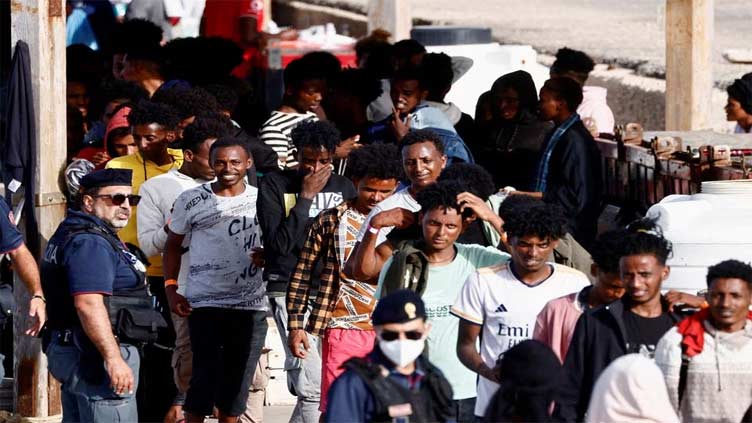Germany's Baerbock joins chorus criticizing EU migration deal with Tunisia

World
Italy, the Netherlands and EU institutions in July signed the agreement with Tunisia
UNITED NATIONS (Reuters) - German Foreign Minister Annalena Baerbock joined a growing chorus of critics of the European Union's new migration deal with Tunisia, saying human rights and procedural faults ruled it out as a blueprint for the future.
Her letter to the EU executive European Commission highlights the EU's inner conflict between those pursuing ever-tougher policies to stop illegal immigration and others who emphasize humanitarian considerations and labor market gaps.
Italy, the Netherlands and EU institutions in July signed the agreement with Tunisia, promising aid to Tunis in exchange for President Kais Saied cracking down on people smugglers and keeping a tighter lid on sea departures.
Italy, where anti-immigration Prime Minister Giorgia Meloni is locked in an uphill battle to keep her electoral promises to reduce arrivals by sea of refugees and migrants from Africa, praised the "true partnership."
But in her letter dated Aug. 2, Baerbock expressed "incomprehension" at what she said were insufficient consultations with other countries in the 27-nation bloc.
"Democracy, human rights and the rule of law must guide us in our cooperation - something that was not given suitable consideration, in the agreement with Tunisia," she wrote.
"The MoU (memorandum of understanding) with Tunisia cannot become a template for further agreements," she added.
A related Sept. 7 letter by the EU's top diplomat, Josep Borrell, which also is not public but was seen by Reuters, highlighted a legal precedent suggesting the Commission might lose in court if sued.
Borrell wrote that similar memos may be in the works with other Mediterranean neighbors, notably Egypt. Despite the criticism, neither he nor the German minister said the deal should be revoked.
/cloudfront-us-east-2.images.arcpublishing.com/reuters/TODVW3Z6ZFPL3FCAYVCD4RNFXE.jpg)
Both letters were addressed to European Commissioner for Neighbourhood and Enlargement Oliver Varhelyi, a member of the European Commission appointed by Hungary and seen as an ally of Prime Minister Viktor Orban, one of the EU's harshest voices against immigration from the Middle East and Africa.
'SERIOUS HUMAN RIGHTS VIOLATIONS AND ABUSES'
Asked to comment on the letters, a European Commission spokeswoman said the EU executive consulted member states enough.
On Friday, the EC announced 60 million euros ($64 million) in support for the Tunisian budget and a further 67 million euros ($71 million) in assistance on migration.
The spokeswoman said the aid was linked to a deal with Tunisia and "will help us address the urgent situation that we see in Lampedusa", a small Italian island that is a first port of call for many people seeking to reach the EU.
But, in an Aug. 17 letter to the EU, also reviewed by Reuters, rights experts mandated by the U.N. Human Rights Council in Geneva listed numerous allegations of grave abuse of migrants by Tunisian authorities.
"This new partnership comes in the backdrop of mounting evidence of serious human rights violations and abuses in Tunisia against sub-Saharan African migrants, refugees and asylum seekers, who are amongst the most vulnerable people in the country," the experts wrote.
Disputes over handling refugees and immigrants have plagued the EU since more than a million people arrived across the Mediterranean in unsafe smugglers' dinghies in 2015.
That caught the bloc by surprise, overwhelmed its security and reception capacities, and fueled bitter rows between member countries that have dented the bloc's unity.
The disagreements remain far from over, as suggested by the letters that came at a time Meloni is calling for even more EU steps against African immigration, including a sea mission to block departures.
The EU scrapped a similar operation a few years ago after criticism, including from Meloni herself, that it had acted both ineffectively and illegally given obligation to save lives.
Increasingly anti-immigration rhetoric is expected to reverberate across the EU ahead of the continent's parliamentary election due in June 2024 even though the bloc is also hosting several million refugees from Russia's war in Ukraine at the same time.

